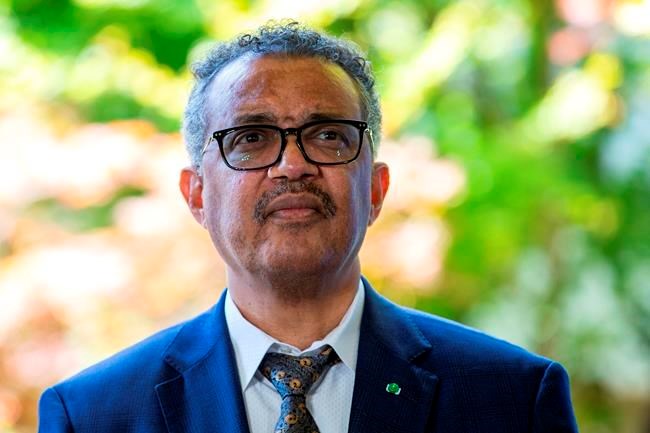TANZANIA, Tanzania — The U.N. health chief declared Friday that positive results from coronavirus vaccine trials mean the world “can begin to dream about the end of the pandemic,” but he said rich and powerful nations must not trample the poor and marginalized “in the stampede for vaccines.”
In an address to the U.N. General Assembly’s first high-level session on the pandemic, World Health Organization Director-General Tedros Adhanom Ghebreyesus cautioned that while the virus can be stopped, “the path ahead remains treacherous.”
The pandemic has shown humanity at “its best and worst,” he said, pointing to “inspiring acts of compassion and self-sacrifice, breathtaking feats of science and innovation, and heartwarming demonstrations of solidarity, but also disturbing signs of self-interest, blame-shifting and divisions.”
Referring to the current upsurge in infections and deaths, Tedros said without naming any countries that “where science is drowned out by conspiracy theories, where solidarity is undermined by division, where sacrifice is substituted with self interest, the virus thrives, the virus spreads.”
He warned in a virtual address to the high-level meeting that a vaccine “will not address the vulnerabilities that lie at its root” -- poverty, hunger, inequality and climate change, which he said must be tackled once the pandemic ends.
“We cannot and we must not go back to the same exploitative patterns of production and consumption, the same disregard for the planet that sustains all life, the same cycle of panic and meddling and the same divisive politics that fueled this pandemic,” he said.
On vaccines, Tedros said, “the light at the end of the tunnel is growing steadily brighter,” but vaccines “must be shared equally as global public goods, not as private commodities that widen inequalities and become yet another reason some people are left behind.”
He said WHO’s ACT-Accelerator program to quickly develop and distribute vaccines fairly “is in danger of becoming no more than a noble gesture” without major new funding.
He said $4.3 billion is needed immediately to lay the groundwork for mass procurement and delivery of vaccines and a further $23.9 billion is required for 2021. That total, Tedros said, is less than one-half of 1
U.N. Secretary-General Antonio Guterres made a similar appeal for funding for the ACT-Accelerator at Thursday’s opening of the two-day General Assembly session. U.N. spokesman Stephane Dujarric said Friday that Guterres is frustrated and would have liked see “a much much higher rate of investment by those countries who can.”
Henrietta Fore, head of the U.N. children’s agency UNICEF, said, “When poor countries started to try to buy vaccines,” there were none available or the price was too high.
UNICEF typically distributes 2 billion vaccine doses a year, she said, and once it can get COVID-19 vaccines, “We’re going to double that next year, so we need all hands on deck.”
U.S. Health and Human Services Secretary Alex Azar said three of the six vaccine candidates that the U.S. government has supported have reported promising data and “I have every reason to believe that more good news about vaccines and other countermeasures is on the way.”
U.S. President Donald Trump has formally notified the U.N. of its withdrawal from WHO, which he has harshly criticized for its response to the pandemic and accused of bowing to Chinese influence.
Azar criticized the lack of “transparent information sharing” about COVID-19 and WHO’s investigation of the virus’ origin. But he said he wanted health ministers to know they can count on U.S.
Despite years of warnings, WHO's Tedros said, many countries were unprepared for the pandemic and assumed their health systems would protect their people. Many countries that have done best dealing with the crisis had experience responding to the outbreaks of SARS, MERS, HINI and other infectious diseases, he said.
WHO has been sharply criticized for not taking a stronger and more vocal role in handling the pandemic.
Tedros told the meeting that “clearly, the global system for preparedness needs attention.”
He said a WHO commission established in September is reviewing international health regulations. WHO is also working with several countries on developing a pilot program in which countries agree to regular and transparent reviews of their health preparedness, he said.
The pandemic also showed the need for a global system to share samples of viruses and other pathogens that cause disease to facilitate development of “medical counter-measures as global public goods” he said, welcoming Switzerland’s offer to use a high-security laboratory to manage a new biobank.
Tedros also backed European Union chief Charles Michel’s proposal for an international treaty under which WHO would monitor the risks of emerging infectious diseases in animals for transmission to humans, ensure alerts of health risks, improve access to health care, and address financing needs. He said this would provide “the political underpinning” for strengthening the global health sector.
The world spends $7.5 trillion on health every year, almost 10% of global GDP, Tedros said, but most of that money is spent in rich countries on treating disease rather than on “promoting and protecting health.”
“We need a radical rethink on the way we view and value health,” he said.
“If the world is to avoid another crisis on this scale,” Tedros said, “investments in basic public health functions, especially primary health care, are essential, and all roads should lead to universal health coverage with a strong foundation of primary health care.”
___
AP Medical Writer Linda A. Johnson in Fairless Hills, Pa., contributed to this report.
Edith M. Lederer, The Associated Press



